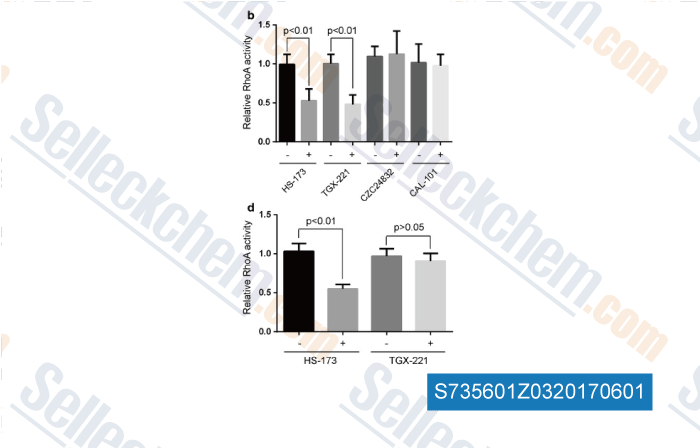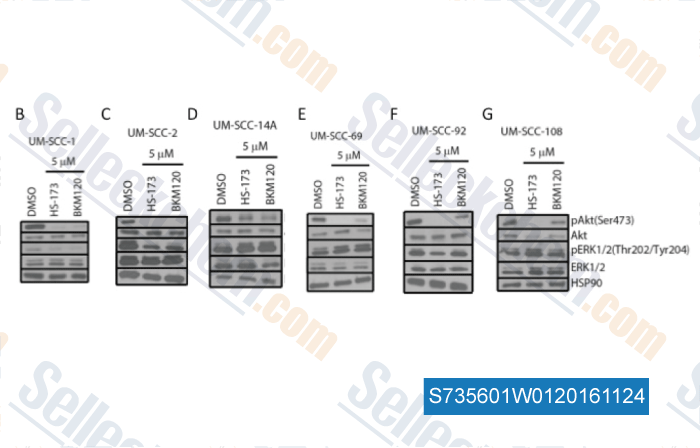|
Toll Free: (877) 796-6397 -- USA and Canada only -- |
Fax: +1-832-582-8590 Orders: +1-832-582-8158 |
Tech Support: +1-832-582-8158 Ext:3 Please provide your Order Number in the email. |
Technical Data
| Formula | C21H18N4O4S |
||||||||||
| Molecular Weight | 422.46 | CAS No. | 1276110-06-5 | ||||||||
| Solubility (25°C)* | In vitro | DMSO | 42 mg/mL (99.41 mM) | ||||||||
| Water | Insoluble | ||||||||||
| Ethanol | Insoluble | ||||||||||
| In vivo (Add solvents to the product individually and in order) |
|
||||||||||
|
* <1 mg/ml means slightly soluble or insoluble. * Please note that Selleck tests the solubility of all compounds in-house, and the actual solubility may differ slightly from published values. This is normal and is due to slight batch-to-batch variations. * Room temperature shipping (Stability testing shows this product can be shipped without any cooling measures.) |
|||||||||||
Preparing Stock Solutions
Biological Activity
| Description | HS-173 is a potent PI3Kα inhibitor with IC50 of 0.8 nM. | ||
|---|---|---|---|
| Targets |
|
||
| In vitro | HS-173 shows potent antiproliferative effects in T47D, SK-BR3, and MCF7 cells with IC50 of 0.6, 1.5, and 7.8 μM, respectively. [1] HS-173 causes complete suppression of the PI3K pathway in cancer cell lines (Hep3B and SkBr3). Moreover, HS-173 induces cell apoptosis by affecting cell-cycle distribution and activating caspases, and block VEGF-induced angiogenesis in vitro. [2] |
||
| In vivo | HS-173 diminishes blood vessel formation in mice. [2] HS-173 markedly attenuates the development of liver fibrosis by blocking PI3K/Akt signaling in vivo. [4] |
||
| Features | PI3Kα-selective inhibitor. |
Protocol (from reference)
| Kinase Assay: |
|
|---|---|
| Cell Assay: |
|
| Animal Study: |
|
References
|
Customer Product Validation

-
, , Cancer Cell Int, 2017, 17:27

-
Data from [ , , Otorhinolaryngol Head Neck Surg, 2016, 1(2): 44-50. ]
Selleck's HS-173 has been cited by 22 publications
| Molecular classification of hormone receptor-positive /HER2-positive breast cancer reveals potential neoadjuvant therapeutic strategies [ Signal Transduct Target Ther, 2025, 10(1):97] | PubMed: 40133264 |
| Lipophagy-related gene RAB7A is involved in immune regulation and malignant progression in hepatocellular carcinoma [ Comput Biol Med, 2023, 158:106862] | PubMed: 37044053 |
| ABCB1 and ABCG2 Overexpression Mediates Resistance to the Phosphatidylinositol 3-Kinase Inhibitor HS-173 in Cancer Cell Lines [ Cells, 2023, 12(7)1056] | PubMed: 37048130 |
| The Pro-Fibrotic Response to Lens Injury Is Signaled in a PI3K Isoform-Specific Manner [ Biomolecules, 2022, 12-91181] | PubMed: 36139020 |
| Advancement of PI3 Kinase Inhibitor Combination Therapies for PI3K-Aberrant Chordoma [ J Neurol Surg B Skull Base, 2022, 83(1):87-98] | PubMed: 35155075 |
| The inhibitors of KDM4 and KDM6 histone lysine demethylases enhance the anti-growth effects of erlotinib and HS-173 in head and neck cancer cells [ Eur J Pharm Sci, 2021, 166:105961] | PubMed: 34363938 |
| Soluble Epoxide Hydrolase Inhibitors Regulate Ischemic Arrhythmia by Targeting MicroRNA-1 [ Front Physiol, 2021, 12:717119] | PubMed: 34646152 |
| Topical Application of the PI3Kβ-Selective Small Molecule Inhibitor TGX-221 Is an Effective Treatment Option for Experimental Epidermolysis Bullosa Acquisita [ Front Med (Lausanne), 2021, 8:713312] | PubMed: 34557502 |
| Topical Application of the PI3Kβ-Selective Small Molecule Inhibitor TGX-221 Is an Effective Treatment Option for Experimental Epidermolysis Bullosa Acquisita [ Front Med (Lausanne), 2021, 8:713312] | PubMed: 34557502 |
| Idelalisib Rescues Natural Killer Cells from Monocyte-Induced Immunosuppression by Inhibiting NOX2-Derived Reactive Oxygen Species [ Cancer Immunol Res, 2020, 8(12):1532-1541] | PubMed: 32967913 |
RETURN POLICY
Selleck Chemical’s Unconditional Return Policy ensures a smooth online shopping experience for our customers. If you are in any way unsatisfied with your purchase, you may return any item(s) within 7 days of receiving it. In the event of product quality issues, either protocol related or product related problems, you may return any item(s) within 365 days from the original purchase date. Please follow the instructions below when returning products.
SHIPPING AND STORAGE
Selleck products are transported at room temperature. If you receive the product at room temperature, please rest assured, the Selleck Quality Inspection Department has conducted experiments to verify that the normal temperature placement of one month will not affect the biological activity of powder products. After collecting, please store the product according to the requirements described in the datasheet. Most Selleck products are stable under the recommended conditions.
NOT FOR HUMAN, VETERINARY DIAGNOSTIC OR THERAPEUTIC USE.
